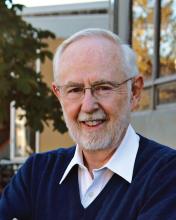By creating clean, ultra-low radioactivity laboratories deep underground to avoid cosmic rays, it is possible to study very fundamental questions about our Universe. These include studies of the tiniest fundamental particles called neutrinos and of Dark Matter, a very important but still mysterious component of the Universe. Dark Matter has only been revealed so far through gravitational effects but represents five times as much mass as the type of matter from which we are composed, It has had a strong influence on how the Universe has evolved since the Big Bang. Experiments to investigate these topics will be described, including the Nobel-Prize-Winning Sudbury Neutrino Observatory (SNO) experiment in which University of Washington scientists played a major role.
Biography: Art McDonald, was born in Sydney, Nova Scotia, Canada. He has degrees in physics from Dalhousie University (BSc, MSc) and Caltech (PhD) and fifteen honorary degrees. From 1969-1982 he was a Research Officer at AECL Chalk River Laboratories; 1982-1989, Professor at Princeton University; 1989-2013 Professor at Queen’s University, Kingston, Canada; 2006-2013 Gray Chair in Particle Astrophysics, 2013-present Gray Chair Emeritus. Since 1989 he has been Director of the Sudbury Neutrino Observatory (SNO) Scientific Collaboration. Among many awards, he is a Companion of the Order of Canada, Co-recipient of the 2015 Nobel Prize in Physics and 2007 Benjamin Franklin Medal; the 2016 Breakthrough Prize in Fundamental Physics and the 2013 Cocconi Prize of the European Physical Society with the SNO Collaboration. He is a member of the Royal Societies of Canada and the UK, Foreign Associate of the US National Academy of Science and a Fellow of the American Physical Society. He continues to be active in basic research in Neutrinos and Dark Matter. In 2020-21 he was the Canadian lead on a project that has delivered more than 7000 low-cost ventilators for the Covid-19 pandemic.
